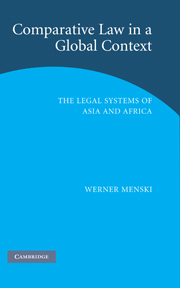Book contents
- Frontmatter
- Contents
- Preface and acknowledgments
- Table of cases
- Table of statutes
- List of abbreviations
- PART I Comparative framework
- PART II Regional comparisons in a global context
- Introduction
- 4 Hindu law: the search for appropriateness
- 5 Islamic law: God's law or men's law?
- 6 African laws: the search for law
- 7 Chinese law: code and conduct
- Conclusion: towards global legal realism
- References
- Index
Introduction
Published online by Cambridge University Press: 09 November 2009
- Frontmatter
- Contents
- Preface and acknowledgments
- Table of cases
- Table of statutes
- List of abbreviations
- PART I Comparative framework
- PART II Regional comparisons in a global context
- Introduction
- 4 Hindu law: the search for appropriateness
- 5 Islamic law: God's law or men's law?
- 6 African laws: the search for law
- 7 Chinese law: code and conduct
- Conclusion: towards global legal realism
- References
- Index
Summary
Part I demonstrated from a variety of angles that cross-cultural legal comparison continues to face major global challenges. The overview of Western legal theory in chapter 3 confirmed that we have only just begun to appreciate the limits of theoretical endeavour in capturing the complex reality of legal pluralism as a global phenomenon. We are now able to see that no single major legal theoretical approach on its own, whether positivism, natural law or socio-legal methods, can encompass the internally plural phenomenon of law. Their pluralist methodological combination, in ways yet to be analysed and explored, promises a deeper understanding of the complex nature of law, but theory will never be able to capture the practically limitless real plurality of law. Problems over the acceptance of radical legal realism are clearly exacerbated by insistence on visions of globalising uniformity that fly in the face of plural socio-legal reality and end up in prescriptive normative tyranny. Part II provides many examples of such clashes of values and their implications. But the legal systems of Asia and Africa will not disappear, nor will they ever merge fully into some ‘global’ legal framework.
A major critique of existing efforts to make sense of other people's legal cultures still needs to be written and is not possible within the present study. The globally focused analysis of Asian and African legal systems raises complex but surprisingly familiar conceptual questions.
- Type
- Chapter
- Information
- Comparative Law in a Global ContextThe Legal Systems of Asia and Africa, pp. 193 - 195Publisher: Cambridge University PressPrint publication year: 2006

